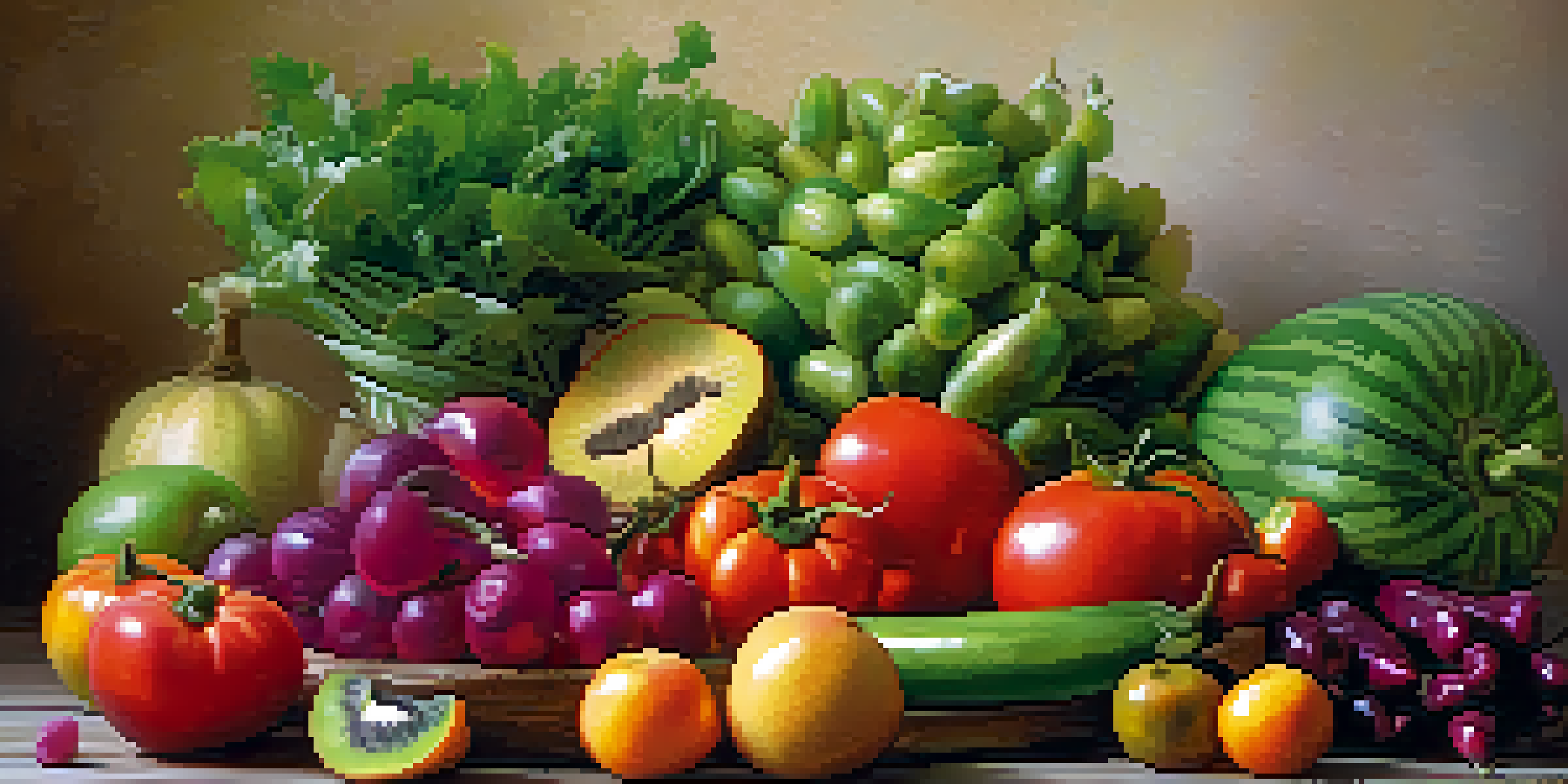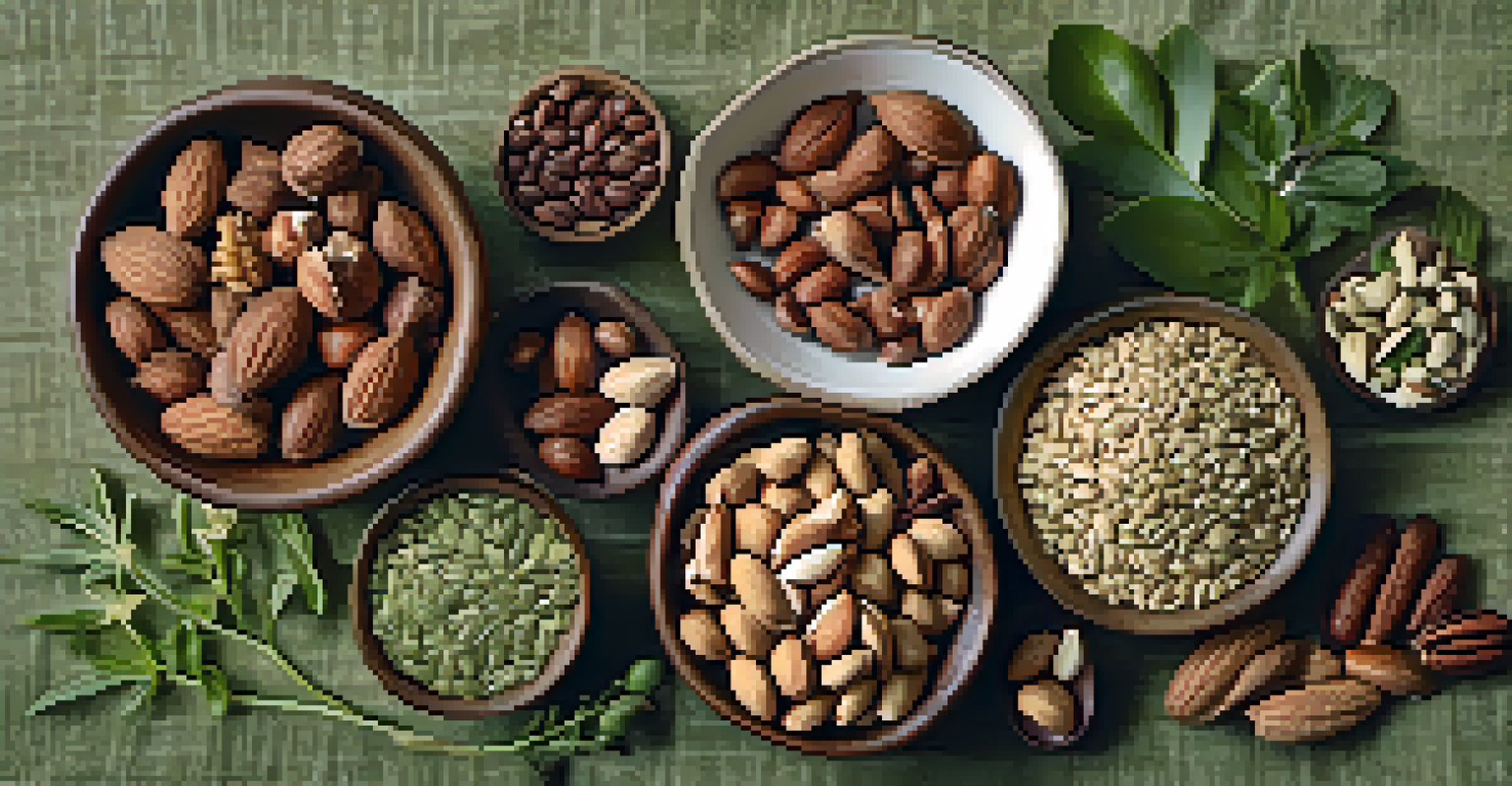Essential Tips for Starting Your 30-Day Raw Food Challenge

Understanding the Raw Food Diet Basics
A raw food diet consists primarily of unprocessed, uncooked plant foods. This means fruits, vegetables, nuts, seeds, and sprouted grains are your mainstays. The idea is that cooking can destroy vital nutrients and enzymes, making raw foods a healthier choice.
Let food be thy medicine and medicine be thy food.
Before jumping in, it’s helpful to grasp the fundamentals. This diet emphasizes whole foods, which means steering clear of refined ingredients and artificial additives. Essentially, you're embracing nature's bounty in its most natural form.
Understanding these basics sets the foundation for your 30-day challenge. It’s not just about what you eat but also how you think about food, encouraging a deeper connection to your meals.
Set Clear Goals for Your Challenge
Before you embark on your raw food journey, it’s crucial to define your goals. Are you aiming to detox, boost energy, or simply explore new culinary experiences? Having clear objectives will keep you motivated throughout the month.

Writing down your goals can be a powerful way to commit to the process. Maybe you want to drop a few pounds or improve your skin's health—whatever it is, make it specific and visible. This way, you can track your progress and celebrate milestones.
Embrace Whole, Raw Foods
A raw food diet focuses on unprocessed, uncooked plant foods to maximize nutrients and create a deeper connection with meals.
Remember, your goals can evolve over time. As you navigate through the challenge, feel free to adjust them based on your experiences and how your body feels. Flexibility can lead to personal growth.
Plan Your Meals Ahead of Time
Meal planning is a game-changer when committing to a raw food challenge. It can be tempting to grab convenience foods when hunger strikes, but having a plan helps you stay on track. Consider dedicating time each week to prepare your meals.
The food you eat can be either the safest and most powerful form of medicine or the slowest form of poison.
Start by researching recipes that excite you. There are countless resources available, from blogs to cookbooks, that showcase delicious raw food dishes. Whether it’s a vibrant salad or a creamy avocado dip, variety is key to keeping meals enjoyable.
Additionally, prepping snacks in advance can save you from reaching for unhealthy options. Think of quick snacks like sliced veggies, fruit, or raw nuts that you can grab on-the-go. Planning ensures you always have healthy choices at hand.
Stock Up on Essential Raw Ingredients
Before diving into your challenge, it’s important to stock your kitchen with essential raw ingredients. Fresh fruits and vegetables are your main staples, but don’t forget items like nuts, seeds, and herbs that can enhance flavors and textures.
Consider visiting a local farmer's market or grocery store that offers organic produce. Fresh ingredients not only taste better but also provide maximum nutrients. Think of colorful fruits and veggies as nature’s palette, waiting to be explored.
Plan and Prepare Your Meals
Meal planning is essential to stay on track during your raw food challenge, ensuring you have healthy options readily available.
Also, keep some pantry staples like raw cacao, coconut oil, and nutritional yeast on hand. These ingredients can add depth to your meals and keep things interesting as you experiment with flavors.
Stay Hydrated During Your Challenge
Hydration is often overlooked but is a vital part of any diet, especially a raw one. Many raw foods have high water content, but it’s still essential to drink plenty of fluids throughout the day. Aim for at least eight glasses of water daily.
Incorporating herbal teas or infused water with fruits can add variety to your hydration routine. Think of refreshing lemon water or calming chamomile tea that can complement your meals. Staying hydrated can enhance your energy levels and overall well-being.
Listen to your body; if you feel thirsty, it’s a sign to drink more. Remember, proper hydration can aid in digestion and help your body detox more effectively during your raw food challenge.
Find Support and Community
Embarking on a 30-day raw food challenge can feel daunting, but finding a supportive community can make a world of difference. Look for local groups or online forums where you can share experiences, recipes, and challenges with like-minded individuals.
Sharing your journey allows for encouragement and accountability. You might find a buddy who wants to join you or simply someone to share meal ideas with. The sense of community can keep you motivated and inspired throughout the month.
Stay Hydrated and Listen to Your Body
Proper hydration and being in tune with your body's needs are crucial for maintaining energy and adapting your diet effectively.
Don’t hesitate to reach out to friends or family for support, too. Whether it’s inviting them to try a raw meal with you or discussing your progress, having a support system can be incredibly uplifting.
Listen to Your Body’s Needs
As you dive into raw foods, it's crucial to listen to your body. Everyone's digestive system is different, and what works for one person may not work for another. Pay attention to how different foods make you feel, and adjust accordingly.
If you experience cravings or low energy, don’t ignore them. This challenge is about exploration, and it’s okay to adapt your approach. Perhaps your body craves a bit more protein or a warm meal; trust your instincts.

Ultimately, the goal is to feel better and more energized. By tuning into your body, you’ll learn valuable insights about your nutritional needs that can benefit you even beyond the 30 days.